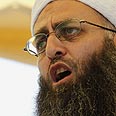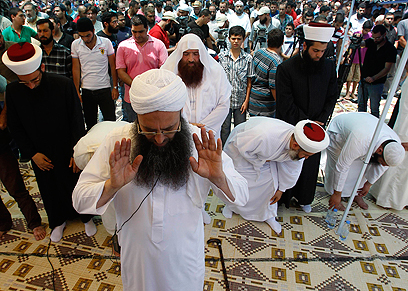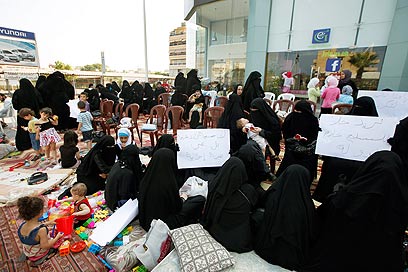
A new era in Lebanon?
Op-ed: Outspoken anti-Hezbollah sheikh part of Sunni renaissance sweeping the Middle East
Assir's unabashed criticism of Hezbollah's private militia has made him a household name throughout Lebanon and the latest thorn in the side of the Shiite-dominated governing coalition. For Hassan Nasrallah, a man long-accustomed to living in the crosshairs of the world's most powerful militaries and spy agencies, the irony must be overwhelming.
For days, Assir and his small band of supporters have blocked entrances to the city of Sidon, refusing to leave until Hezbollah's vast arsenal is relinquished to the state. "We absolutely won't open the road, not even if a decision is made in the UN Security Council,” Assir lamented during a recent interview. “The protest will resume peacefully until death. We cannot live without dignity and the Resistance’s (Hezbollah’s) arms have deprived us of dignity.”

Assir held prayer service on road (Photo: Reuters)
The roots of Assir’s political activism can be traced back to May 2008, when Hezbollah militants clashed with rival Sunni militias, overwhelming them and taking control of large swathes of Beirut in a matter of hours. The fighting erupted over an ongoing dispute between Hezbollah and the then-Sunni dominated government of Saad Hariri over the former’s private communications network. The quick defeat of Sunni militias sparked a political earthquake in Lebanon, eventually leading to the ousting of Hariri’s coalition in the following elections.
In the media, the clashes were portrayed as a Hezbollah victory, further humiliating Lebanon’s Sunnis and spurring discontent with the inaction of their political parties to counter Hezbollah. As such, the Sheikh rose to fill the void between disillusioned Sunnis and their political leaders, by openly criticizing Hezbollah’s refusal to fuse its powerful militia with the State’s security forces.
Not a one-time phenomenon
To a large extent, Assir owes his surging popularity to the crisis taking place in neighboring Syria. Capitalizing on Hezbollah’s alliance with the Syrian regime, he was among the first Sunnis to stage anti-Assad demonstrations in the heart of Beirut. Across the country, his protests in solidarity with Sunni rebels in Syria have outnumbered those staged by other sympathetic Lebanese factions, including Hariri’s Future Movement.
While Lebanon’s political heavyweights scoff at the Sheikh’s notoriety, their efforts to silence his divisive campaign have proven futile. Assir’s roadblocks in Sidon have continued, snubbing personal appeals from Interior Minister Marwan Charbel and from former Prime Minister Fuad Saniora. In early July, the Lebanese army scrapped plans to forcefully remove the Sheikh hours before implementation.

Assir's supporters block road (Photo: EPA)
The hesitation to forcefully remove Assir from Lebanon’s political spotlight reveals the predicament in which he has placed his adversaries. Traditionally, nuisances to the influence of Hezbollah and the pro-Syrian camp were easily handled by assassinations, with the most high profile case being that of former Lebanese Prime Minister Rafik Hariri in 2005.
Today, that dynamic has changed. The Sunni-led uprising in neighboring Syria has brought sectarian tensions in Lebanon to potentially explosive levels, with even the slightest political tremor serving as a detonator.
Assir’s critics claim that sectarian strife is exactly what he aims to provoke. By listening to any one of his sermons, there is little doubt that he holds a deep, irreparable grudge towards Lebanon’s Shiites. In addition to enduring years of humiliation by Hezbollah’s private army, the Sheikh belongs to an ultraconservative stream of Sunni Islam called Salafism, one whose uncompromising nature leaves little tolerance for the Shiite denomination.
Despite his radical background and relatively small following, Assir has managed to usher in a new era in Lebanon. By refusing to cower to Hezbollah’s intimidation, he has become the leader that even moderate Sunnis have been secretly longing for.
Meanwhile, deep in his bunker underneath the streets of Beirut, Nasrallah can only watch in angst as Assir continues to denounce his faction on Lebanese television. Keenly aware of the profound changes taking place across the region, Nasrallah surely understands that Sheikh Ahmed Assir is not a one-time phenomenon. He is part of the Sunni renaissance sweeping the Middle East, one that even Hezbollah’s powerful private militia may not be able to stop.
The author is an intelligence manager at Max Security Solutions, a geopolitical risk consulting firm based in the Middle East. You can follow him on twitter @dannynis










